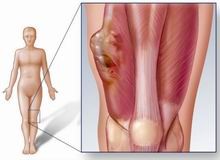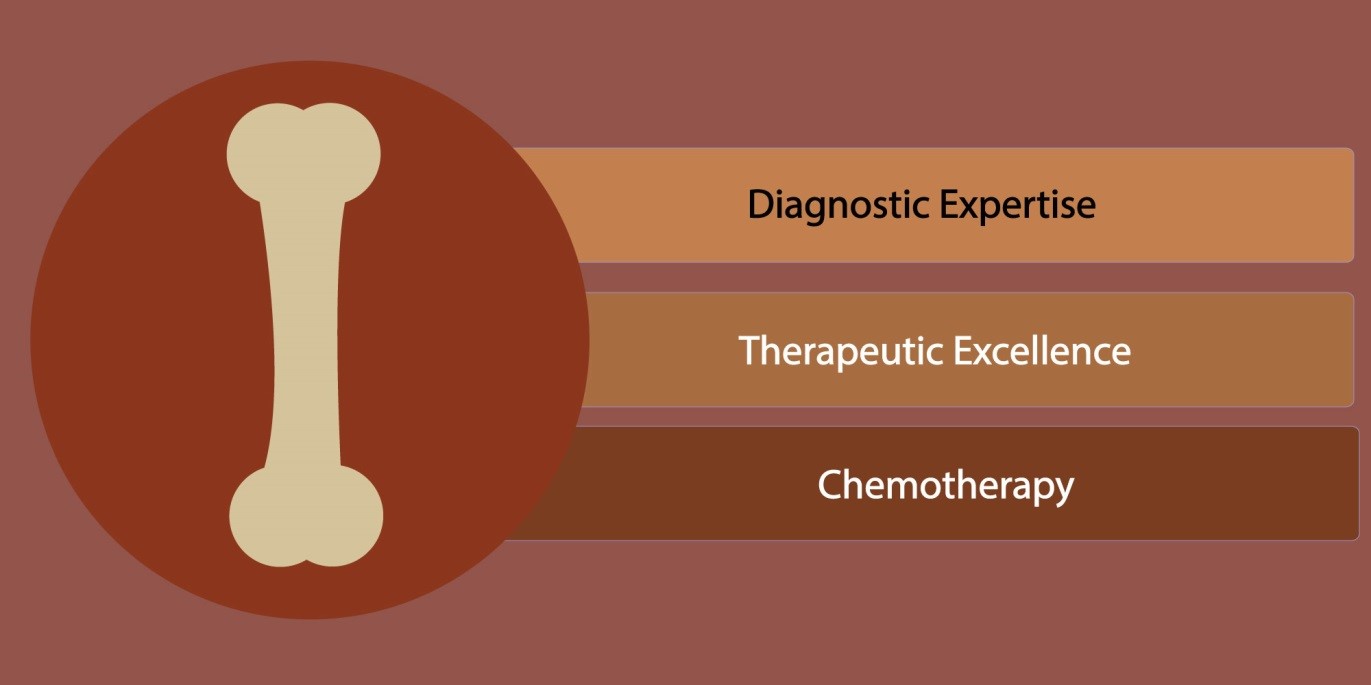NUHS Institutions will NEVER ask you to transfer money or disclose bank details over a call.
If in doubt, call the 24/7 ScamShield helpline at 1799, or visit the ScamShield website at www.scamshield.gov.sg.
Sarcoma is a rare type of cancer that arises in the bone and soft tissue, which includes fat, muscles, blood vessels, nerves and fibrous tissue. Sarcomas can develop in any part of the body, though they are most commonly seen in the arms and legs.

Soft bone sarcoma occuring in the leg
There are very few known risk factors for sarcomas. These include:
Some chemicals are also thought to be associated with sarcoma, though this has not been proven. Smoking, diet and exercise are not linked to developing sarcomas.
*People who think they may be at risk should discuss this with their doctor.
The signs of sarcoma depend on the site where they arise. Patients with bone sarcoma present with the following symptoms.
*A doctor should be consulted should the above symptoms occur.
Given the limited risk factors, it is difficult to prevent sarcomas. There are no screening tests, and the best approach is for patients with new lumps, or lumps that are increasing in size, to seek medical attention early. This is especially so for patients who have a strong family history of cancer, or patients with previous radiation therapy treatment.
If there are signs and symptoms of sarcoma, your doctor may order some imaging tests. These include, plain x-rays, CT scans, ultrasound scans, MRI scans or even PET or bone scans. The test selected depends on the location of the lump.
After the imaging tests are done, a biopsy is needed to confirm the diagnosis of sarcoma. This can either be done as a needle biopsy, or a surgical biopsy.
Needle biopsies are done using a core biopsy needle. These remove a 1mm core of tissue from the tumour, and can be done in the clinic or under by a radiologist in the radiology centre using imaging guidance. Multiple cores are often needed in order to obtain sufficient tissue for a diagnosis. Fine Needle Aspiration (FNA) biopsies are not used frequently for sarcomas because insufficient tissue is obtained.
Surgical biopsiesmay be required for some tumours, especially bone sarcomas and large soft tissue sarcomas.
Biopsies have to properly planned and should be performed by teams with experience in sarcoma treatment. An improperly performed biopsy may make subsequent removal difficult and may compromise outcomes of treatment.
The specimen taken during the biopsy is processed and reviewed by the pathologist. At times, further these using molecular tests may be required in order to establish the diagnosis.
Once a diagnosis of sarcoma is made, further imaging investigations may be required to complete the staging of the cancer. This helps to assess the prognosis for the patient.
Surgery
Based on the diagnosis and staging, the team will then recommend the appropriate treatment. The possible modalities for treatment include surgery, chemotherapy and radiotherapy. The treatment is decided by a multi-disciplinary team that includes specialists from all fields involved in patient management.
Radiation Therapy
Radiation therapy makes use of ionising radiation to eradicate cancer cells. It is often used as an adjuvant treatment in support of surgery to further reduce local recurrences of sarcoma. When warranted, it is typically given after surgery when risk factors for recurrence are identified, though it can sometimes be given before surgery. After surgery, the operative and pathological findings are discussed at a multi-disciplinary tumor board to identify risk factors for recurrence and the need for adjuvant radiation therapy.
Chemotherapy
Chemotherapy is the use of drugs given systemically either into a vein (parenterally) or taken by mouth (orally) to treat cancer. These drugs enter the bloodstream and reach all areas of the body, making this treatment useful for cancer that has spread (metastasised) to other organs.
Depending on the type and stage of sarcoma, chemotherapy may be given as the main treatment, as an adjuvant (addition) to surgery or as neoadjuvant therapy (prior to surgery to downsize the tumor).
The choice of chemotherapy is highly dependent on the type of sarcoma , and usually consists of a combination of several anti-cancer drugs.
The need for chemotherapy will be discussed at a multi-disciplinary tumor board based on investigations and pathological reports available.

Sarcomas consist of many different types of tumours with varying degrees of aggressiveness, and may arise in any part of the body. Such complex tumours are best dealt with by a multi-disciplinary team consisting of pathologists, diagnostic radiologists, oncologists and other support staff. At the NCIS, our sarcoma multi-disciplinary team focuses our expertise to bring about the best outcomes for our patients.
Diagnostic Expertise
Optimal treatment of sarcomas depend on accurate diagnosis. To achieve this, our team of pathologists and diagnostic radiologists work closely together, complemented by the latest equipment and techniques in diagnosis and imaging.
Histopathology
a biopsy specimen is sent to our pathologists for review, an assessment is made of the type of tumour. Appropriate immunohistochemical stains and molecular tests complement traditional methods used to arrive an accurate diagnosis. In rare instances, where diagnosis is difficult to determine even with these tests, a network of international experts can be consulted for a second opinion.
Imaging
full range of diagnostic imaging modalities are available to help in treatment planning, including Magnetic Resonance Imaging (MRI), Ultrasound (US), Computed Tomography (CT) scans, Bone scans and Positron Emission Tomography (PET). These imaging techniques help guide clinicians on the optimal site of biopsy, determine local extent disease and its appropriate treatment. Where tumours are deep and close to critical organs, image guided biopsy techniques are used to give the best chance of a successful biopsy.
Therapeutic Excellence
Surgical Oncology
Our surgical oncology team has expertise in both prosthetic and micro-surgical reconstruction following limb salvage surgery for sarcomas, for both children and adults. The most appropriate surgical treatment will be used for each patient, following discussion with specialist team. Some of the techniques used were developed locally by pioneers in this field.
Radiation Therapy
Our Linear Accelerators used to treat patients are equipped with 3D conformal Radiotherapy (3DCRT), Intensity Modulated Radiotherapy (IMRT) and Stereotactic Radiotherapy capabilities. The most appropriate modality is chosen for each patient based on tumour location and patient anatomy. Our radiation therapy planning process targets the highest radiation therapy dose at the tumour while minimising dose to normal tissue. Each radiation therapy plan undergoes multiple layers of safety checks before being peer-reviewed to ensure quality.
Chemotherapy
The NCIS is the only one-stop centre in Singapore equipped with the specialties to treat both adults and children who are diagnosed with sarcoma.
Our paediatric and adult oncologists work hand in hand to tailor the chemotherapy treatment for the unique group of adolescents and young adults who are diagnosed with sarcoma.
The Pharmacy @ NCIS provides specialised oncology drug compounding services for all anti-cancer therapies in the NCIS and related supportive therapy for all patients at the outpatient cancer centre pharmacy.
Holistic Sarcoma care is provided by the Sarcoma Treatment Team at the NCIS by bringing together the expertise and dedication of multi-disciplinary specialists spanning across pathologists, radiologists, surgeons, radiation and medical oncologists. Together, the team is committed to delivering uncompromised and dedicated clinical research, expertise and care in the prevention, management and cure of Sarcoma.
Surgery
Medical Oncology
Paediatric Haematology-Oncology
Pathology
Radiation Oncology
Radiology